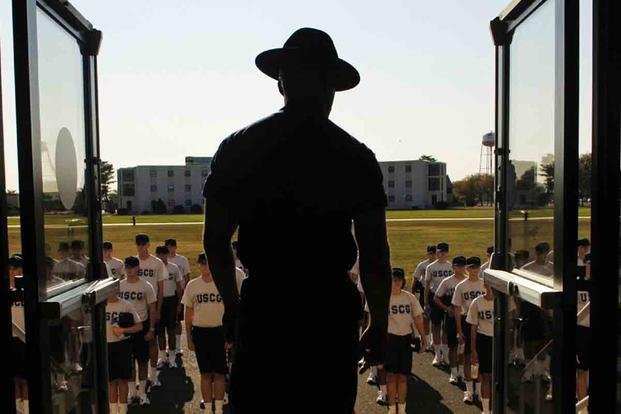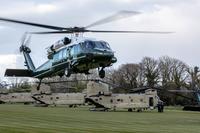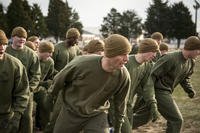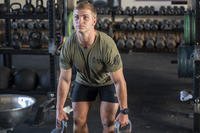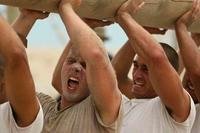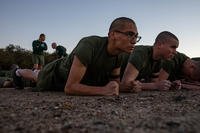There are specific similarities and differences between the service branches, but you can group the six services in pairs and see how they compare and contrast. Pairs such as the Navy and Coast Guard, Air Force and Space Force, and Army and Marine Corps have more similarities than differences. Depending on which branch you're choosing, you may consider adjusting your physical preparation to many of the specific demands of that branch to excel in the training.
Each branch has its own physical fitness tests and required height and weight standards. For even the most unathletic recruit, training several months before you join will help you build the needed durability to avoid injury and the required muscle stamina, strength and endurance to meet the physical standards.
Compared to the other services, the Army and Marine Corps have the most difficult physical training requirements. It's not that the other branches' physical standards are easier; they are just easier in comparison to the Army Combat Fitness Test and the USMC PFT/CFT. The added rucking and load-bearing requirements of these branches place the Army and USMC into a different category of physical preparation, compared to the other four branches. Durability as a function of strength is needed more in these branches because of these common activities, and because the Corps is amphibious, water training before joining is recommended as well.
Though the physical demands of the Navy and Coast Guard are not as high in boot camp training programs in these branches, a single component sets them apart: the water. As a Navy and Coast Guard member, you will be subject to water survival training, swimming, treading and near water for most of your time in the military.
Learning how to swim and tread is wise, as you will receive extra training to learn these skills in boot camp if you fail. Besides, swimming is a survival skill and makes you effective in 75% of the planet. Don't risk your life by not learning to swim or tread, whether you join the military or not. The fitness standards are not easy to pass, but if you are new to fitness training, you must get on a program that helps you improve as a runner and swimmer and on push-ups and plank poses. Check out this all forces guide to survival swim testing/training.
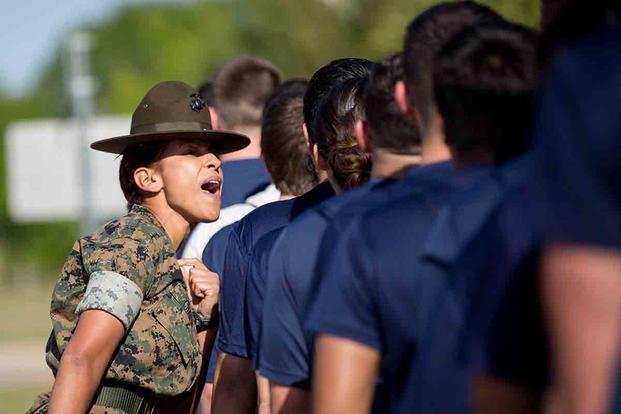
Both the Air and Space Force seek technically savvy recruits, though all branches of service have jobs that require more technical know-how. The basic fitness standards are not as difficult as those for the other services, but they are still challenging if you try to attend Basic Military Training (BMT) as someone who did not prepare for neither the fitness tests nor the other fitness and body-weight requirements. Currently, the Air Force and Space Force attend the same military indoctrination program, or BMT, at Joint Base San Antonio-Lackland, Texas.
Prepare for the physical demands of boot camp/basic training, which includes long workdays and nights, running, rucking, swimming and high-repetition calisthenics. However, do not overlook flexibility and mobility to help you reduce the risk of injury while training. Discover how to avoid common pitfalls and come out of boot camp successfully with this comprehensive checklist:
1. Build Your Endurance
Physical endurance and stamina are crucial for successfully completing boot camp. The intense physical demands of military training require recruits to push through long hours of training, carry heavy gear and perform physically demanding tasks without breaking down. Building your endurance and stamina before entering boot camp will make the transition into training much smoother and increase your chances of success.
See Military.com's Fitness Center to help with training ideas. For the Army, Marine Corps and special-ops candidates, running and rucking (walking with a weighted backpack) are essential for building the cardiovascular and muscular endurance needed for your specific physically demanding military training.
2. Get Ready for Long Days
Get a job or attend school full time before you join (or both) in order to build the needed work ethic to handle long workdays and physical fitness training each day. Long workdays simulate the nonstop nature of military training, helping your body and mind adapt to sustained physical activity. Put it this way: There are no naps scheduled into the weekday of training. Get used to working.
3. Strength Training Is a Must
High-repetition calisthenics, such as push-ups, pull-ups and sit-ups, are key in building strength, muscle stamina and a high work capacity. These exercises help develop muscular endurance, which is essential for performing repetitive physical tasks during training. You may need to add weight training if you have never lifted and will be rucking and lifting heavy equipment in a future job. All of this pre-training will help you build mental toughness as it requires discipline and perseverance to do consistently.
4. Don't Get Injured
Flexibility and mobility are crucial in reducing the risks of injury and excelling in training, especially events such as swimming, treading and obstacle course events. Incorporate stretching and mobility exercises daily into your routine to improve your range of motion and pliability.
5. Find Motivation and Discipline
Your initial motivation to serve is admirable, but to see success, motivation must evolve into discipline. To stay motivated and disciplined in your physical preparation for boot camp, set specific, attainable goals; create a structured workout plan; and enlist the support of friends, family or a training partner to keep you on track and accountable.
6. Don't Forget to Rest
You are working now in preparation for service, so you do not fall prey to "overtraining" while enduring basic training. You must train hard but not too hard. You can do this by incorporating adequate rest and recovery into your training regimen, which is essential to avoid injury and fatigue. Listen to your body and schedule rest days for recovery and muscle repair.

Preparing for service training is important, regardless of the branch you select. The final piece is nutrition and hydration. Fueling yourself and staying hydrated is a requirement for all branches of service, especially when training in hot, humid (or arid) climates. Even the easiest of training days can turn you into a heat casualty by skipping proper hydration and electrolytes, and your physical performance can quickly deteriorate if your food consumption is not effective.
How should you prepare? Specific to your branch of choice and job within the service. That should drive your training options each day before joining.
Stew Smith is a former Navy SEAL and fitness author certified as a Strength and Conditioning Specialist (CSCS) with the National Strength and Conditioning Association. Visit his Fitness eBook store if you're looking to start a workout program to create a healthy lifestyle. Send your fitness questions to stew@stewsmith.com.
Want to Learn More About Military Life?
Whether you're thinking of joining the military, looking for fitness and basic training tips, or keeping up with military life and benefits, Military.com has you covered. Subscribe to Military.com to have military news, updates and resources delivered directly to your inbox.
